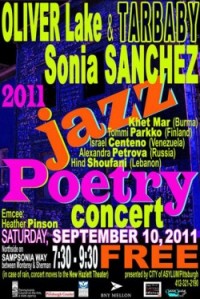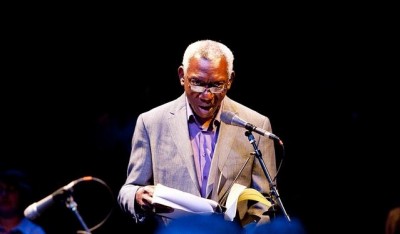Yusef Komunyakaa Reflects on Jazz Poetry Concert 2010
by Sampsonia Way / September 8, 2011 / No comments
City of Asylum Pittsburgh‘s Jazz Poetry Concert is almost here! On September 10 Sampsonia Way, an alley in Pittsburgh’s Northside, will become the stage for the acclaimed outdoor concert. This is a unique opportunity to spend an evening with poet Sonia Sanchez, legendary musician Oliver Lake, the Tarbaby Trio, and some of the best writers from around the world.
The poet Yusef Komunyakaa read at the 2010 Jazz Poetry Concert and wrote about the experience for Sampsonia Way.
“My poetry is not political,” I heard Huang Xiang say to the camera.
It was humbling to sleep two nights in the house at 408 Sampsonia Way, where Xiang’s “HousePoem” has been painted on the front façade in white calligraphy. I felt psychically safe in this house; it seemed here I had permission to travel dangerously in my head, to plumb a place where the blues come from, to question the covert politics of language. How does one write about grief, about the tender struggles of love, about the unsayable? How would I ever complete this journey into my psyche?
Saturday, September 11, the Year of the White Tiger.
Upstairs, I resumed reading Xiang’s book A Life is a Promise to Keep, trying not to overhear the PBS interview being conducted below me, down in the living room / kitchen. This is where Xiang lived for nearly three years after spending five years in prison in China. I was thinking, saying to myself: But even the most simplistic language in certain situations can be political, and in that sense almost every text is elastic, especially since it is a composite of symbols. We live by metaphors. Even silence is political.
I was thinking of our rehearsal the day before with the Oliver Lake Band. At first, with doubt on the faces of some of the musicians, the youngbloods, I was ready for the whole thing to dissolve and fall apart. Our ensemble of voices was international: Khet Mar (Burma), Maryia Martysevich (Belarus), andHinemoana Baker (Aotearoa/New Zealand). Each was unique, each conjuring a personal music beckoning interplay with the instruments. How did the Beats during the 50’s attempt to bring jazz and poetry together without rehearsals? That is the reason numerous gigs like this failed; this recent history resonated in my head. I chose five poems for the reading: “You Made Me,” “When Eyes Are on Me,” “Blue Dementia,” “Requiem,” and “Ode to the Saxophone.” Once we were feeling a groove, listening closely to each other, willing to let language and music merge, we were ready to surprise ourselves. A crack appeared in the collective mask. There was something in Lake’s compositions, an echo of the blues that embraced my voice. And he had chosen sixteen musicians, each fully connecting to his vision. After three or four attempts, we had reached the nexus. We were running somewhat long, so I cut “Requiem,” a piece infused with second-lining riffs that conjured the Crescent City. I could feel a symmetry of intention between all of us.
I heard the cameraman packing up to leave. I heard their voices in the street. I tiptoed to the window and caught a glimpse of Xiang. There was something jaunty in his demeanor, and this surprised me. How could a poet end up behind bars – were we still a few feet inside Plato’s cave? Standing there at the window, I realized I was inside a work of art, momentarily residing in someone’s necessary vision—The City of Asylum.
The short trek from Sampsonia Way to the New Hazlett Theater was a moment of meditation, as two volunteers escorted me around the Carnegie Free Library, the Bell Tower struck by lightning, the Planetarium renovated into the Children’s Museum, buildings that are monuments to the recent past, made to last. The readers and musicians sat in the green room, in the smell of catered food in take-away containers, trading stories and anticipating riffs. Three young musicians were tossing a blue miniature football, sliding back and forth across the concrete floor.
Actor, David Conrad, emceed the night; he was at home with the crowd of five hundred. The first set began with readings by Hinemoana Baker, Horacio Castellanos Moya (a terrific magical realist now exiled from El Salvador), Khet Mar, and a surprise poet. These held everyone’s attention, especially Baker’s amazing voice that seems perfect for the Maori language. And then the night’s surprise poet began to chant his poems from the balcony. There was a playful insinuation at the edge of Huang Xiang’s presence; many in the crowd knew him. His “Wild Beast” poem ran to the edge of vocalized daring Pandemonium.
The Oliver Lake Band was on the money—cool and hot as The Count and Duke, with a tinge of Mingus. This moment underscores why music travels internationally. Its hard-edged eloquence and authority were crystal clear. Everyone was digging each other—wordsmiths and musicians—listening closely. If any ghosts of the Beats were hanging around the New Hazlett Theater that night, they were finally learning something about how music and words can reach an unbelievable register of bittersweet truth that’s unforgettable.
Read a profile on Yusef Komunyakaa.
Can’t make it to the concert? No worries. No matter where you are, sit back with a glass of wine and watch the Jazz Poetry Concert streaming live on the web at http://www.livestream.com/jazzpoetryconcert and right here on Sampsonia Way. Plus, join the conversation on Twitter with hash tag #jazzpoetry.






